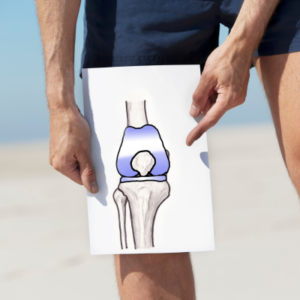Few procedures have the potential to be so life-changing as joint replacement surgery. It is offered to patients with severe arthritis who may have spent years in pain and with declining mobility. As quality of life diminishes and worsening symptoms make it harder and harder to continuing doing the things you enjoy., some people may develop depression. So, undergoing surgery can not only transform your physical health but also have a big impact on your mental wellbeing, too.
Deciding when to have surgery

Robotic Arm-Assisted Total Knee Replacements: Pros and Cons
Patients are encouraged to delay as long as possible before having joint replacement surgery and there are good reasons for this. All surgery carries a risk, however small, so we prefer to treat joint pain non-surgically wherever possible, for as long as possible. And, although prosthetic implants are improving all the time, nevertheless they don’t last forever. Most implants last between 15 and 25 years so if you have joint replacement surgery at a young age, you are likely to outlive your artificial joint and may need a replacement. We use a procedure called revision joint replacement, which entails removing the worn-out implant and replace it with a new one. However, the risk of complication is higher with revision joint replacements than with primary joint replacement surgery and outcomes tend to be poorer.
This is why we recommend delaying primary joint replacement surgery for as long as possible – both to minimise your risk and to avoid the chances of needing revision surgery at a later date. It can be a tricky balancing act because we don’t want patients to experience pain or poor quality of life for an extended period of time, so it is important to have regular discussions about the best timing of your surgery with your doctor. In some cases, it can be the patient themselves who wants to delay, sometimes due to fears about having joint replacement surgery or worries about the impact of surgery on their day-to-day life. Again, talking to your doctor is advisable to help allay any unfounded fears.
Read what patients say
It can be helpful to read patient reviews on Iwantgreatcare.org to hear about other people’s experiences of joint replacement surgery. One patient of York Orthopaedics’ Ed Britton at Nuffield Hospital York, writing on 7 July 2023, said:
“For too many years I foolishly put up with pain in my hip, hoping at some point the pain would stop. Wow, what a difference after meeting Mr Britton and his fantastic team. My first consultation with Mr Britton made me feel at ease, comfortable and confident that all would go well and it did. After only six weeks, from having a full hip replacement, I am up and about pain-free. I have experienced the best treatment in the best hands, resulting in pain-free quality of life.”
On 17 July another wrote:
“Brilliant doctor/surgeon and the surgery has completely changed my life.”
Considerations for joint replacement surgery
Here are some things that it can be helpful to consider when deciding whether (and when) to have joint replacement surgery:
Understand what is involved
We recommend finding out as much as you can in advance about the procedure you are having. You can do this by talking to your orthopaedic surgeon, reading the information they provide and looking at authoritative sources online. It can be helpful to make a list of questions to ask your surgeon about.
Talk to your surgeon about the risks
Your surgeon will talk to you about the potential risks. This is not to alarm you but to make you aware of some of the things that can go wrong so you can make informed choices. Joint replacement surgery is a routine procedure and the risk of complications is small, but nevertheless there are always risks associated with any type of surgery.
Understand the non-surgical alternatives
If your symptoms are mild to moderate, it can be helpful to understand the non-surgical alternatives. These include painkillers and anti-inflammatories, physiotherapy exercises and injections of corticosteroids into the affected joint. If you have severe joint pain, however, these treatments may not provide sufficient relief from your symptoms.
Be aware of the impact of doing nothing
If you have a degenerative disease like osteoarthritis your symptoms are likely to worsen as the condition develops. There are things you can do to slow the development of the disease and to manage your symptoms so we recommend seeking a diagnosis as early as possible so you can be proactive about the management of your condition.
If you have joint pain (hip, knee, elbow, thumb, ankle or shoulder) and would like to discuss diagnosis and treatment options, please contact us.
Further Reading:
Hip Arthritis
Hip Replacements
Revision Hip Replacements
Knee Arthritis
Knee Replacements
Partial Knee Replacements
Revision Knee Replacements
A Leading Team of Orthopaedic Specialists – North Yorkshire
We are a team of specialist orthopaedic surgeons each of whom has a particular area of expertise. Not only are we the largest orthopaedic practice in North Yorkshire but we have been established the longest and have many satisfied patients. Take a look at our Testimonials page to see what they say.
Telephone: 01904 373032
Email: info@yorkorthopaedics.co.uk
OUR LOCATIONS
Clifton Park Hospital – Main Hospital Shipton Rd, Rawcliffe, York YO30 5RA – Directions
Clifton Park Hospital – Outpatients Department, Equinox House, Clifton Park Ave, York YO30 5PA – Directions
Nuffield York Hospital – Haxby Rd, Clifton, York YO31 8TA – Directions






